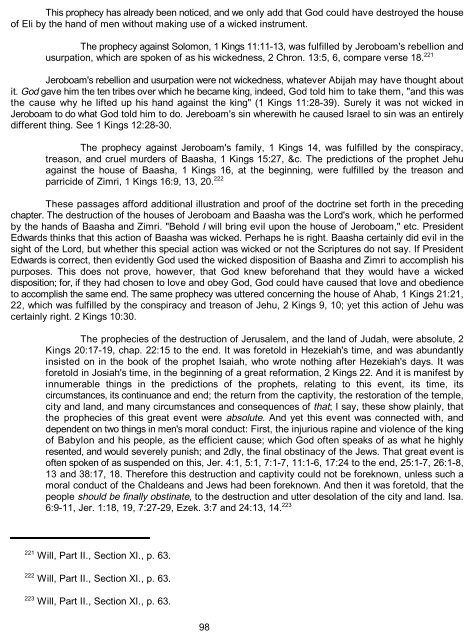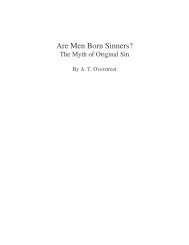Foreknowledge by Joel Hayes - Library of Theology
Foreknowledge by Joel Hayes - Library of Theology
Foreknowledge by Joel Hayes - Library of Theology
Create successful ePaper yourself
Turn your PDF publications into a flip-book with our unique Google optimized e-Paper software.
This prophecy has already been noticed, and we only add that God could have destroyed the house<br />
<strong>of</strong> Eli <strong>by</strong> the hand <strong>of</strong> men without making use <strong>of</strong> a wicked instrument.<br />
221<br />
Will, Part II., Section XI., p. 63.<br />
222<br />
223<br />
The prophecy against Solomon, 1 Kings 11:11-13, was fulfilled <strong>by</strong> Jeroboam's rebellion and<br />
usurpation, which are spoken <strong>of</strong> as his wickedness, 2 Chron. 13:5, 6, compare verse 18. 221<br />
Jeroboam's rebellion and usurpation were not wickedness, whatever Abijah may have thought about<br />
it. God gave him the ten tribes over which he became king, indeed, God told him to take them, "and this was<br />
the cause why he lifted up his hand against the king" (1 Kings 11:28-39). Surely it was not wicked in<br />
Jeroboam to do what God told him to do. Jereboam's sin wherewith he caused Israel to sin was an entirely<br />
different thing. See 1 Kings 12:28-30.<br />
The prophecy against Jeroboam's family, 1 Kings 14, was fulfilled <strong>by</strong> the conspiracy,<br />
treason, and cruel murders <strong>of</strong> Baasha, 1 Kings 15:27, &c. The predictions <strong>of</strong> the prophet Jehu<br />
against the house <strong>of</strong> Baasha, 1 Kings 16, at the beginning, were fulfilled <strong>by</strong> the treason and<br />
parricide <strong>of</strong> Zimri, 1 Kings 16:9, 13, 20. 222<br />
These passages afford additional illustration and pro<strong>of</strong> <strong>of</strong> the doctrine set forth in the preceding<br />
chapter. The destruction <strong>of</strong> the houses <strong>of</strong> Jeroboam and Baasha was the Lord's work, which he performed<br />
<strong>by</strong> the hands <strong>of</strong> Baasha and Zimri. "Behold I will bring evil upon the house <strong>of</strong> Jeroboam," etc. President<br />
Edwards thinks that this action <strong>of</strong> Baasha was wicked. Perhaps he is right. Baasha certainly did evil in the<br />
sight <strong>of</strong> the Lord, but whether this special action was wicked or not the Scriptures do not say. If President<br />
Edwards is correct, then evidently God used the wicked disposition <strong>of</strong> Baasha and Zimri to accomplish his<br />
purposes. This does not prove, however, that God knew beforehand that they would have a wicked<br />
disposition; for, if they had chosen to love and obey God, God could have caused that love and obedience<br />
to accomplish the same end. The same prophecy was uttered concerning the house <strong>of</strong> Ahab, 1 Kings 21:21,<br />
22, which was fulfilled <strong>by</strong> the conspiracy and treason <strong>of</strong> Jehu, 2 Kings 9, 10; yet this action <strong>of</strong> Jehu was<br />
certainly right. 2 Kings 10:30.<br />
The prophecies <strong>of</strong> the destruction <strong>of</strong> Jerusalem, and the land <strong>of</strong> Judah, were absolute, 2<br />
Kings 20:17-19, chap. 22:15 to the end. It was foretold in Hezekiah's time, and was abundantly<br />
insisted on in the book <strong>of</strong> the prophet Isaiah, who wrote nothing after Hezekiah's days. It was<br />
foretold in Josiah's time, in the beginning <strong>of</strong> a great reformation, 2 Kings 22. And it is manifest <strong>by</strong><br />
innumerable things in the predictions <strong>of</strong> the prophets, relating to this event, its time, its<br />
circumstances, its continuance and end; the return from the captivity, the restoration <strong>of</strong> the temple,<br />
city and land, and many circumstances and consequences <strong>of</strong> that; I say, these show plainly, that<br />
the prophecies <strong>of</strong> this great event were absolute. And yet this event was connected with, and<br />
dependent on two things in men's moral conduct: First, the injurious rapine and violence <strong>of</strong> the king<br />
<strong>of</strong> Ba<strong>by</strong>lon and his people, as the efficient cause; which God <strong>of</strong>ten speaks <strong>of</strong> as what he highly<br />
resented, and would severely punish; and 2dly, the final obstinacy <strong>of</strong> the Jews. That great event is<br />
<strong>of</strong>ten spoken <strong>of</strong> as suspended on this, Jer. 4:1, 5:1, 7:1-7, 11:1-6, 17:24 to the end, 25:1-7, 26:1-8,<br />
13 and 38:17, 18. Therefore this destruction and captivity could not be foreknown, unless such a<br />
moral conduct <strong>of</strong> the Chaldeans and Jews had been foreknown. And then it was foretold, that the<br />
people should be finally obstinate, to the destruction and utter desolation <strong>of</strong> the city and land. Isa.<br />
6:9-11, Jer. 1:18, 19, 7:27-29, Ezek. 3:7 and 24:13, 14. 223<br />
Will, Part II., Section XI., p. 63.<br />
Will, Part II., Section XI., p. 63.<br />
98






